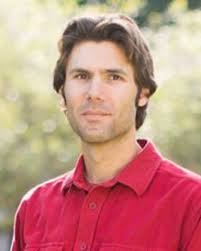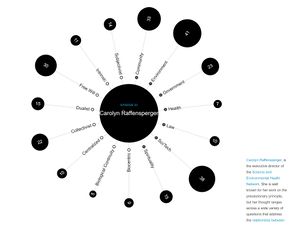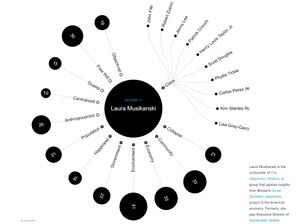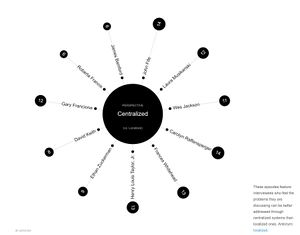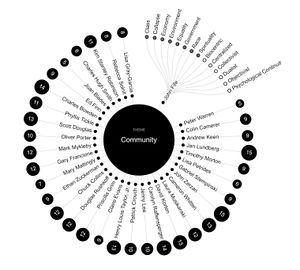The Conversation
red
Who 누가
앵거스 앤더슨 (Aengus Anderson) [1]
디지털 미디어 제작자(오디오 특화. 라디오 및 팟캐스트). 구두 역사가(oral historian)
I split my time between recording oral histories about Southern Arizona for Special Collections and telling stories about the UA Libraries through video and photography.
애리조나 대학교(The University of Arizona)에 직접 작성한 자기소개 문구로 미루어봤을 때 그는 자신의 정체성을 구두 역사를 기록하는 기록가로 정의한 듯하다.
실제로 인터넷에서 그가 제작한 여러 테마의 팟캐스트를 만나볼 수 있는데 The Conversation 다음에 진행되고 있는 그의 프로젝트는 '장소'와 관련된 쟁점들을 논의하는 Tucsonense이다.
When & Where 언제 그리고 어디서
2012-2016. 온라인 팟캐스트 라디오 프로젝트 (2012-2016. Podcast Radio Project)
앵거스 앤더슨은 2012년부터 미국 전역을 돌아다니면서 각계의 전문가나 영향력 있는 인사를 만나 '미래'라는 쟁점에 대한 대화를 녹음한다. 그는 녹음한 파일을 편집한 후에 인물별 인터뷰로 사이트에 업로드한다.


사진에서는 자전거지만 인터뷰 당시에는 오토바이를 탔을 것이다.
지도는 사이트에 업로드된 인터뷰이들의 거점지이다. 실로 미국 전역을 오간 것을 확인할 수 있다.
What & Why 무엇을 그리고 왜
무엇 : 대화와 인터뷰 conversations and interviews
Now, in 2011 I began thinking about my next long radio project. I’d already produced two sprawling projects about how Americans perceive the past and the present. This would be the project about the future. And this is the project about the future. This is The Conversation.
It became a thing in early 2012, when I started traveling America and interviewing a cross-section of creative thinkers and doers about how their work was shaping the future, what kind of futures they wanted, and why they thought those futures were good. I told the interviewees about each other, told my cohosts Micah Saul and Neil Prendergast about the interviewees, and from this great game of telephone we looked for patterns, trends, the ever-elusive zeitgeist of our historical moment.[2]
| 2011년 당시 미래에 대한 프로젝트를 갈구하던 앤더슨은 창의적인 생각을 가진 사람들과 활동가들을 만나서 그들이 미래를 어떻게 그리고 있는지, 어떠한 미래가 구현되어야 하는지에 대한 생각을 듣는다. |
|---|
| 그는 인터뷰한 내용을 편집해 팟캐스트로 업로드했으며 인터뷰의 말미에 공동 진행자(Micah, Neil)과 인터뷰 내용에 대한 토론을 녹음해 후첨한다. |
| 그는 이 팟캐스트를 '타임캡슐' 프로젝트라 여겼다. 그래서 단순히 인터뷰에 그치지 않았으며 인터뷰한 내용을 분석해 그들의 답 안에 패턴을 찾고 현대인들의 시대 정신을 반영해 현대의 역사를 한 장으로 기록하고자 했다. |
왜 : 현재의 주류와 미래의 상식 탐구 mainstream ideas of today and common sense of tomorrow
That said, I think most of the best work tends to lean towards small stories with emotional personal narratives and…relatively little complexity. They are after all going for listeners, which makes a lot of sense.
In a way, it answered one of the questions that I started the project with. I don’t know if there have been society-wide conversations about the future in past eras—perhaps there have been. But I’m pretty sure there isn’t one now.[3]
He contacted Jan Lundberg for an interview in April and said, "I will be traveling America in search of ideas that are out of the mainstream today but may inform the common sense of tomorrow."[4]
the goal of facilitating a conversation about the paradigms we may have to leave behind if we’re to build the future we want.[5]
It’s framed around big questions: Are we in a time a crisis? How would you describe the challenges we face? What does a better future look like?[6]
| 앤더슨은 작은 이야기들의 힘을 믿었다. 그는 결국 모든 일들은 작은 개인의 이야기에서 출발한다고 생각해 인터뷰를 진행했다. 그는 개인의 이야기를 통해 미래를 그릴 수 있다고 생각해 프로젝트를 제작했다. |
|---|
| 그는 현대 논의되는 주류의 아이디어, 현재의 패러다임을 알기 위해 인터뷰를 진행했다. 더불어 현대에서 무엇을 버려야 하는가에 대한 질문을 던진다. |
| 우리는 위기의 시대에 살고 있는가? 혹은 더 좋은 미래로 나아가기 위해서 현재에서 무엇을 취하고 무엇을 버려야(left behind)하는가?에 대한 질문의 답을 찾으며 그만의 미래를 그린다. |
I started feeling a growing sense of absurdity as the project progressed. Which I hope you did not hear in our discussions at the time.
You know, finite time, an inability to know who the thinkers are outside of their tiny subfields, let alone to comprehend the intersection of global systems. And I began to think that we can’t diagnose our problems. And if we could we couldn’t agree on whose diagnosis to choose. And if we could agree on a diagnosis we couldn’t agree on a plan of action. And if we could agree on a plan of action we could never muster the will to do anything, anyway.
In a horrible way I feel like I kind of—I’m aligning with Joseph Tainter, even though in so many ways I found his interview…really hard to deal with, because it was so…deterministic. (중략) Because conversation, even when it’s illogical and driven entirely by emotion, still implies that we’re governed by a higher form of logic, right? An orderliness that can be mapped from above by psychologists or sociologists or advertisers or…someone. That’s appealing. It gives us conscious agency of a sort.
Yet, even in the moment I knew that each interview had a gem or two in it. (중략) A few interviewees in the project have suggested the conversation may not matter in the moment, but it does expand the menu of ideas future generations have to choose from.
This isn’t exactly a conversation, by traditional definition. But I think it’s a lot more realistic than the salon model of conversation I began this project with. It’s a nice middle ground between arguing that conversation and logic and persuasion matter, and simply throwing up one’s hands and becoming a lame cynical determinist. I mean, seriously. Who wants to be one of those?
| 추가적으로 언급하자면 이 프로젝트에는 하나의 단점이 있었다. 다수의 대답이 꽤나 결정론적이었다는 것이다. 그들은 이미 미래를 '전제'한 상태에서 답했으며 그들이 그리는 미래의 범위는 편협해졌다. |
| 인터뷰는 특정 분야의 전문가를 대상으로 했기에 다수가 자신이 속한 분야 내에서만 답했다. 더 큰 문제는 전문가들 사이에서의 '합의점'조차 찾기 힘들다는 것이었다. 각자의 분야에 갇힌 시각에서 '미래의 문제'에 대해 합의하지 못한다면 아무런 '행동'으로 이어지지 못하기 때문에 그는 인터뷰를 지속하는 것을 포기했다. |
| 그러나 축적된 인터뷰의 가치 자체에 대해 부정하는 것은 아니었다. 그는 자신의 인터뷰가 오히려 결정론자들의 미래에 대한 시니컬한 자세와 일반의 우리들을 연결해 주는 중간 지대역할을 하고 있다는 입장을 밝힌다. |
|---|
How 어떻게
팟캐스트 podcast
| 내용의 구성 |
|---|
| 인물 그림(주제 반영) ㅡ 인터뷰 대상에 대한 설명 ㅡ 팟캐스트 ㅡ 관련 자료(reference) ㅡ 온톨로지 |
| 팟캐스트의 구성 |
| 인물 소개 (앤더슨 단독, 코호스트들과의 대담) ㅡ 본 인터뷰 (질의응답 < 독백 ) ㅡ 인터뷰이(interviee)에 대한 대담. 상념을 덧붙임 |
| 앤더슨은 시각적으로 대상을 최대한 감추거나 번형하는 반면 청각적인 요소는 매우 강화해 제공한다.
앤더슨의 인터뷰는 대화식이 아니라 독백에 가깝다. 인터뷰이의 말에 개입을 거의 하지 않으며 청자로 하여금 그/그녀의 주장, 이야기에 온전히 녹아들 수 있는 몰입의 기회를 제공한다. |
온톨로지 : 인물-핵심어 그물망 ontology : interviewee- keyword web
| 연결 체계 |
|---|
| 1) 인터뷰이 ㅡ 인터뷰에서의 가치 체계를 보여주는 어휘 ㅡ 어휘를 언급한 다른 이들의 수 (+ 그들의 이름)
2) 가치 체계/주제어 ㅡ 가치 체계/주제어를 언급한 이들 ㅡ 그들이 언급한 여타의 가치 체계/주제들 |
| 연결망을 구축한 이유 |
| Even if we are only looking at a subjective interpretation of how thinkers leaned within their conversations, we now have a tool to see patterns too large to notice through memory and audio alone. |
| 듣기만 해서는 알 수 없는 가치의 패턴을 확보할 수단을 위해 온톨로지를 구축했다. |
| 연결망에 대한 몇 가지 사실 |
| 1) It does not purport to show how the thinkers would categorize themselves or how their perspectives lean regarding other topics or at different times.
2) it doesn’t show the degree to which a thinker leans towards a perspective.
|
| 1) 인터뷰이의 본질적인 가치관이 아니라 철저히 인터뷰 내용만을 기반으로 했다. (= 가치관과 다를 수 있다.)
2) 인터뷰이가 얼마만큼 그러한 관점에 심취해 있는지 나와있지 않다.
|
Comment 논평
주제와 사용자 경험(UX)에 대한 단상:The Source와의 비교
The Source 페이지에서 확인
- ↑ 실제 진행에는 앤더슨 외에 구글 온톨로지 전문가 미카(Micah Saul)와 역사가 니엘(Neil Prendergast)이 있으나 프로젝트의 중심 진행자이자 시작자가 앤더슨이기에 앤더슨에 대한 사실만 정리했다. 사이트 제작에는 이 외에도 삽화가 엘레노어(Eleanor Davis)와 데이터 시각화 제작자 크리스(Chris Wilard), 로고 제작자 알퍼(Alper Kologlu)와 음악가 왈라스(DS Wallace) 등이 프로젝트에 참여했다.
- ↑ 두 인용은 모두 앤더슨의 마지막 팟캐스트 방송 EPISODE 67: AENGUS ANDERSON에서 차용한 것이다.
- ↑ 앤더슨의 마지막 팟캐스트 방송 EPISODE 67: AENGUS ANDERSON 내 인용.
- ↑ 블로그 논평1. http://www.culturechange.org/cms/content/view/840/1/
- ↑ 블로그 논평2. https://blog.longnow.org/02012/05/31/alexander-rose-on-the-conversation/
- ↑ 블로그 논평 3. https://www.solvingforpattern.org/2013/02/09/in-conversation-with-wes-jackson/

